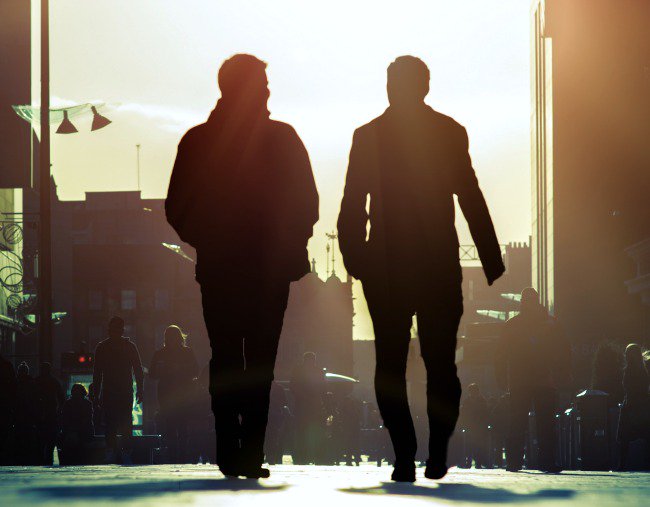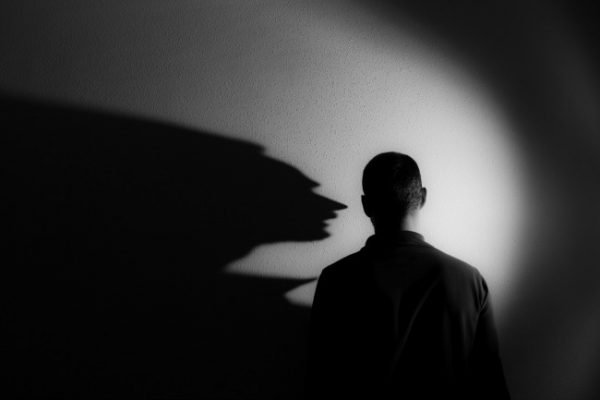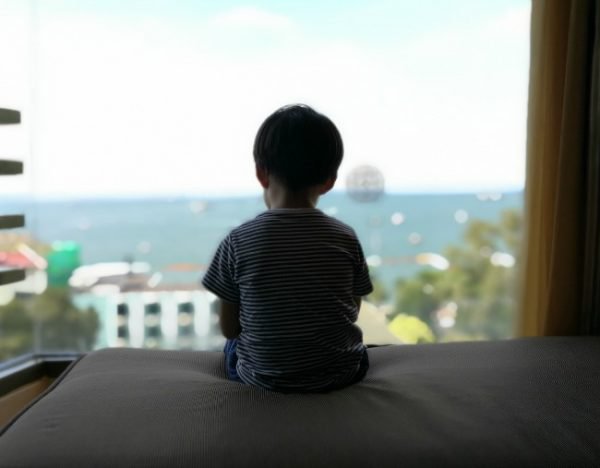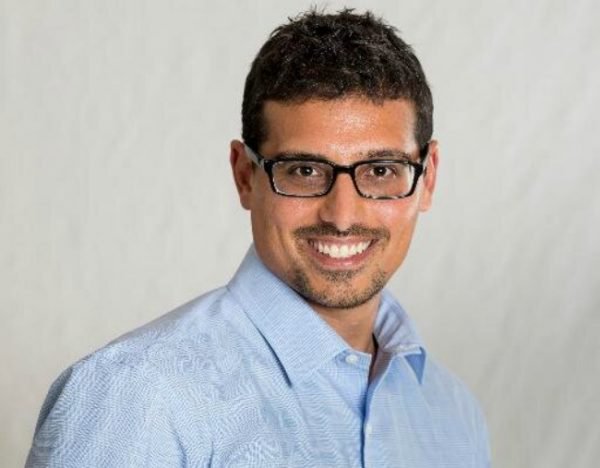Two paedophiles speak: What it's like to be born in a body with a "cursed" mind
Mamamia
Michelle Andrews
2 September 2017

Content note: This post deals with themes of child sex abuse, and may be triggering for some readers.
What if your precious boy – the one you butter sandwiches for and kiss on the head at night – grows up to be a paedophile?
It’s a terrifying prospect. According to Dr Sarah Goode, whose research focuses on understanding adult sexual attraction to children, between three and seven per cent of men say they would have sex with a prepubescent child if they were guaranteed to go undetected.
If that statistic is accurate, and proceeding studies indicate it is, at least 362,000 Australian men feel sexually attracted to children.
They don’t live in swamps or creep down alleyways late at night. They exist among us, while concealing their innermost thoughts from the world. You might sit across from them at work. You might be friends with them. Related to them. Married to them.
Love them.
Before two paedophiles speak, let’s make one thing absolutely clear: Nobody is here to defend people who abuse children. Instead, we will hear from the men who harbour paedophilia, yet have pledged to never act on it. The men who have these feelings and thoughts, but who say they will never destroy a child’s life, and despise those who do.
The men who can tell us – more than any suit-clad politician can – what the hell we can do to protect our children.
This is not an easy article to read. But what if we pushed through what feels unconscionable and demonic, dark and scary, to ultimately create a place that’s safer for our kids?
 Meet the men who harbour paedophilia, yet have pledged to never act on it. (Image: Getty)
Meet the men who harbour paedophilia, yet have pledged to never act on it. (Image: Getty)
Two non-offending paedophiles speak
As we understand it today, a paedophile's brain is "hard wired" from birth.
According to University of Toronto's Dr James Cantor, who is renowned for leading the world's most sophisticated research in the area, the physiology of a paedophile's brain differs 'significantly' in comparison to the average person's; a discrepancy he described to the ABC as "a literal cross-wiring".
So far, there is little credible evidence to suggest paedophiles are 'made'. Rather, they are born.
Nigel and Ender (not their real names) are two of these men, who liken their situation to being awarded "the most terrible sexual orientation" possible. Despite this, they describe themselves as "virtuous" and have pledged to never act on their paedophilia.
Nigel is a 22-year-old engineering student who identifies as an "exclusive" paedophile. That is, "only attracted to children." He first realised his attraction to children when he was 14.
Ender is in his 40s, a Catholic, and a "non-exclusive" paedophile. Not only is he attracted to adult women, he's been married for over a decade.
On some level, Ender says he always knew he had a sexual interest in prepubescent boys. His first "crush" occurred at eight years old, and by the time he was 14 it dawned on him that while he aged, some of the people he was sexually interested in didn't.
"I kept hoping it was just a phase and that I would eventually be 'just' gay," Ender says. "But by the time I was 16 it had become obvious that I was never attracted to anyone my age any more, and that all the boys I was attracted to were significantly younger than myself.
"It just became more obvious that it was something I could never tell anyone about, so I never did and I grew up coping with it all by myself, being mostly miserable about the idea that I would never find someone to love, that no one could ever love me."
A life of "pretending" eventually unravelled. As a grown man, Ender faced the prospect of telling his wife of over 10 years - with whom he has children - who he really was.
"It was only three years ago when I decided to come out to her and tell her I was a paedophile," Ender says.
"And while she was hurt that I had kept this secret from her, she understood why I was so afraid to tell anyone," he says, adding that the revelation has brought a new deepness to their relationship.
"She also understood that this wasn't anything I had chosen for myself, and she knows that I would never harm a child. So ultimately she forgave me and accepted me, and she loves and supports me now knowing this aspect of myself."
Nigel's first response was also to keep his paedophilia a secret, but years later his closest family and friends now know the truth.
"I only decided to come out earlier this year," Nigel tells Mamamia. "I first did to a friend, a very good friend of mine, and he took it well. It gave me confidence and eventually I told my parents.
"Sorry, but I have no sexual attraction to adults whatsoever," Nigel says. "I can say a woman is pretty, or a guy is handsome, but it stops there.
"[That said], I don't watch child pornography, I don't molest children, I don't even have a close relationship with a boy in particular."
For Ender, paedophilia is a "curse" of which there are no winners, only confused souls and vulnerable victims.
"Anyone who sexually abuses a child should pay the consequences of their acts," he says.
What can you do today to make your children safer?
For every non-offending paedophile like Nigel and Ender, there are undoubtedly men who choose the alternative. So, I asked them, how do we keep kids safe from the people who didn't make the same decision you did?
"There are many things you can do," Nigel says, although conceding that "predators are creative and they find ways."
Primarily, the millennial wants parents of children to be stricter when it comes to the internet and webcams, and to educate them of the dangers attached with 'sexting'.
"Don't allow a young child to have a device with a webcam or camera, or control what they do with it," Nigel says. "The vast majority of child pornography produced is just a child filming him or herself in their bedroom, with a webcam, phone or tablet. Often these videos fall into the hands of paedophiles or are requested by paedophiles."
 "Don't allow a young child to have a device with a webcam or camera, or control what they do with it." (Image: Getty)
"Don't allow a young child to have a device with a webcam or camera, or control what they do with it." (Image: Getty)
From there? Nigel says to ignore what feels "harsh", and to simply follow what the research tells us. Considering more child sexual abuse is carried out by male relatives (30.2 per cent) than anyone else in the child's orbit, he says parents should avoid having uncles and older brothers babysit children.
Close adult mentoring outside the family - in the form of family friends (16.9 per cent), neighbours, and acquaintances (15.6 per cent) - also poses a risk, he says.
"If an adult asks to have your kid spend some time at their house, take them home from school for you, or drive them places without good reason... that is not a good sign in my humble opinion," Nigel says.
"Please don't allow your child to spend [unsupervised] time alone with a religious leader or teacher, they don't need it... you are their parents and you choose who your children are allowed to be with."
Of course, a hardline attitude could feed into what he calls "paedo-hysteria" - but he says these are simply the facts. Ultimately, Nigel believes a parent's own judgement on what is and isn't good for their child is sound.
For Ender, to predict what a predator might do is near impossible. The best protection comes from fostering a healthy parent-child relationship and promoting "comprehensive and age-appropriate sexual education."
Above all, he says, "[the most important thing] is harbouring an environment of love and trust between the child and the parent, such that the child will never be afraid to tell their parents something out of fear of their parent's reaction."
From a survivor’s perspective, trust is also important. Child sex abuse survivor Manny Waks, who testified before the Royal Commission into Institutional Responses to Child Sexual Abuse in 2016, told Mamamia that maintaining honesty between children and parents is paramount to help end abuse.
“We need to talk about it and keep talking about it," Waks says. "I believe that when perpetrators see a particular child they are thinking of grooming, if that child has some kind of training, their vulnerability decreases, and they're not seen as such an easy target.
“If you have an open and honest relationship with your child you will be able to pick up early signs, even at a grooming stage."
Ultimately, though, we need to empower communities to keep kids safe. And that means not just responding to child sexual abuse when it happens - but stopping it from happening in the first place.
What can we do tomorrow and beyond?
Our 'let's get tough on crime because all paedophiles are evil scum' mentality may not be helping children - but harming them.
Between 2015 and 2016, the Australian Institute of Family Studies reported 5,559 children suffered sexual abuse - and those are just the ones who were in the position to file an official report. Given it apparently takes, on average, more than 30 years for a child sex abuse victim to come forward, this number seems undoubtedly tiny; minuscule to what is a monumental issue.
In three decades' time, we will likely learn the number of Australian children sexually abused every single year isn't just in the thousands. It's probably in the tens of thousands.
Nobody knows the depth of this destruction quite like Carol Ronken, who has studied child sex abuse policies for 14 years and is the director of research and policy at Bravehearts, one of Australia's leading organisations into preventing child sexual abuse.
"We know how horrific the life-long impact is," Ronken told Mamamia. "These victims are ensconced in the mental health system, often for the rest of their lives.
"[Child sex abuse victims] have skyrocketing chances of developing mental health problems, including major depression, suicidality, and drug and alcohol dependence."
We know little lives are being destroyed, but how do we save them?
Redressing the language we use around paedophilia would be a good start, says Waks, who was assaulted while attending Melbourne's Yeshivah Centre when he was 11.
"It's not good to say 'lock them up and throw away the key' or 'shoot them all'," Waks says.
"I can understand the passion and the anger, and all the emotions attached to such a sensitive and controversial issue, but it causes significant damage. This kind of language prevents victims from coming forward because when that child sees the public calling sex offenders monsters, they are most likely referring to their father or their grandfather.
"Child victims don't want to see their family torn apart, and they don’t want to be shamed, so it’s a very difficult position for victims to see such harsh language used around their abuser, because the statistics tell us they're probably their loved one."
 Abuse survivor Manny Waks has gone on to become the CEO of Kol v'Oz, which he established in Israel in 2016 to prevent child sexual abuse in Jewish communities globally.
Abuse survivor Manny Waks has gone on to become the CEO of Kol v'Oz, which he established in Israel in 2016 to prevent child sexual abuse in Jewish communities globally.
For Dr Kelly Richards, a senior lecturer at Queensland University of Technology's school of justice, change also needs to start in the way we consider the intersection between paedophilia and child sex abuse.
"Not everyone who has paedophilia necessarily acts on that attraction," Dr Richards tells Mamamia. "Not everyone who commits child sex abuse is a paedophile. Most child sex offenders aren’t actually paedophiles at all, they're what we call situational offenders."
Both Ronken and Dr Richards believe Australia has found itself in an injurious cycle, where we only respond to child sex abuse once it has happened, rather than stopping it from ever occurring in the first place.
And that is precisely the problem. We know what's broken, but we're failing to fix it.
Why? Because in a tough political climate, it's tempting for one to focus on a 'tough on paedophilia' cause. That gets votes. Hard line policies on the 'monsters' make almost every Australian watching the nightly news bulletin mutter under their breath, "good, dirty scum". Because of course. In a nightmarish collision of paedophiles and innocent children, who wouldn't fiercely defend the latter?
And that necessitates ignoring the men like Nigel and Ender, who just want help.
"We have no inherent desire to harm anyone, let alone the people we happen to be attracted to through no choice of our own," Ender says.
"[The public] should judge paedophiles by their actions, and not their unchosen feelings."
Where to from here?
"We need to ask ourselves, 'If that was my son who came home at 13 or 14 and began thinking these thoughts, what response would I want?'," Dr Richards says. "We would want him to speak to someone about it... we would want him to seek professional help without fear of being an outcast."
This brand of thinking is not revolutionary or new. In fact, in the UK, there are groups like not-for-profit StopSO, which focuses on making specialist treatment for paedophiles more accessible to ultimately prevent sexual offending.
Through connecting a "UK wide network of experienced therapists trained and willing to work with [paedophiles]" StopSO assists non-offending paedophiles and their partners establish a lifestyle, where children remain free from harm.
Germany's Dunkelfeld project, which seeks to treat paedophiles before they offend, also "offers a free and confidential treatment option at all of its sites for people seeking therapeutic help with their sexual preference for children and/or early adolescents."
The effectiveness of such programs has been recognised, with The Journal of Sexual Medicine reporting the Dunkelfeld project "alters" child sexual offending through reducing related-behaviours. While such preventative approaches might not be bullet-proof, they are necessary in the mission to ending child sex abuse.
This is precisely the kind of program experts would like to see implemented here in Australia.
"[These programs] are really about getting them to manage how they’re going to live with this sexuality, to prevent them from acting on it," Dr Richards from Queensland University of Technology says.
"It busts this myth that paedophiles don’t want help, or are seeking out their next victim. There are people like that, absolutely - but it’s a myth that they are all like that. I think the fact that men are travelling from the UK to Germany to seek help shows they're determination to not offend - and the less children we have abused, the better.”
Abuse survivor Waks agrees.
“I am a very big proponent of offering opportunities to paedophiles so they can manage their paedophilic attraction. If we can find a way that we can manage at least some of these people that would be an improvement or the right way forward in my opinion."
Yet a preventative approach like Dunkelfeld - one that might take decades to show results, but will help save children from rape - doesn’t offer the immediate action that some people would like to see. And for politicians, when your seat is up for grabs in four years' time, you want the public to see the fruit of your labour now.
Perhaps that's why the notion of a public sex offenders register, something that is tangible and concrete, is so appealing.
The idea behind an Australian register was the initiative of the Daniel Morcombe Foundation, which was founded by parents Bruce and Denise Morcombe after the abduction, abuse, and murder of their 13-year-old son at the hands of psychopath Brett Peter Cowan. Named Daniel's Law, both the foundation and Derryn Hinch's Justice Party seek to highlight how many child sex offenders live within a given area.
If Daniel's Law was to be implemented nationwide, parents would be able to view local sex offenders without knowing their specific street address. You could know precisely how many predators were out there, and you would know their faces and names; but arguably, there would be little you could do with this information.
Similar approaches in the US have been accused of swelling public anxieties and compelling harmful vigilantism, but the Daniel Morcombe Foundation's CEO Holly Brennan denies this would be the case in Australia.
"It’s not a vigilante approach, what it means is that people can't pretend that this isn't an issue, or one that can't be helped," Brennan says.
“There were 15 known dangerous offenders on the coast at [the time Daniel went missing]. It’s not saying that we want to make people scared all the time, but we need to know what's out there so that people to be vigilant, and know that you do need to be safe.
“It highlights that this is an issue and one we can’t pretend isn’t part of our neighbourhood. Child safety is everyone’s business."
But if you ask Bravehearts' Ronken, public sex offender databases do not make children safer, especially when we consider the vast majority of sexual abuse occurs at the hands of relatives - not strangers.
“Research shows these kinds of populous legislation and policy responses aren’t working," Ronken says. "It sounds appealing but they just don’t work. But because they sound fabulous, they get grabbed onto."
Dr Richards agrees, adding: "We’re just waiting for that person, that politician who’s willing to stick their neck out, because at the moment we are burying our heads in the sand."
Still, abuse survivor Waks believes we have "a right" to know if predators are wandering down the aisles of our local supermarket, regardless of whether a database is a flawless mechanism or not.
Regardless of where you stand on Daniel's Law, of one thing we can be certain: when they fail to prevent child sexual abuse from occurring, Australian governments are not doing what's best for children.
And so this cycle, the one that has created a society where one in five children are sexually assaulted by the age of 15, keeps spinning. Faster and faster and faster. And the more we revile them, the more those 362,000 paedophiles stay silent. The more we cry 'monster', the more victims keep their mouths shut. The more politicians shout, the more men turn away from help.
And so more paedophiles grow up to believe their destiny is predetermined. And the more they sink into the nooks and crannies. And the more they disengage.
And when paedophiles disengage? The more likely they are to offend.
Mamamia reached out to National Children's Commissioner Megan Mitchell, but she declined to comment. Mamamia also reached out to Derryn Hinch's Justice Party - they did not get back to us by time of publishing.
Originally published at Mamamia.